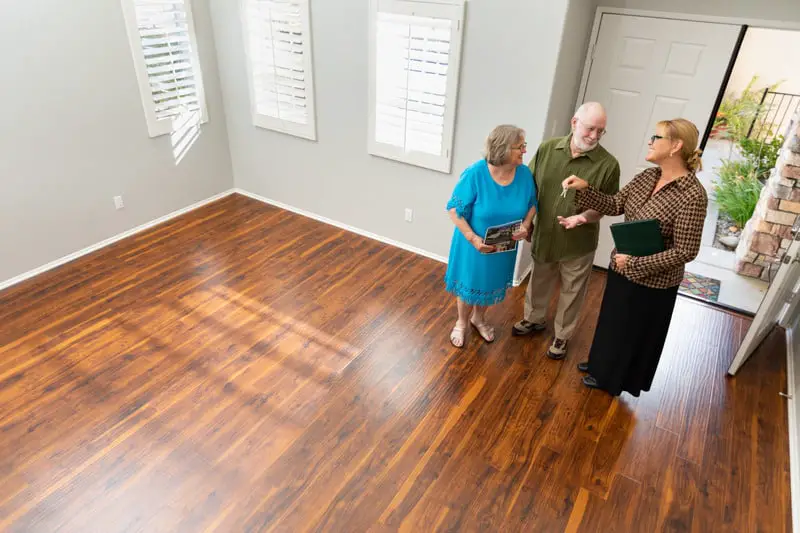
Finding a home to rent out in a retirement community can prove difficult due to restrictions and availability. It is not always met with approval by governing homeowner’s associations. The ideal candidates for residence in these areas are those who want to purchase a home and are of the age group designated.
Can you rent a house in a retirement community? The problem is not that you can’t rent a home in a retirement community, because you absolutely can, and people do. However the retirement community homeowner’s associations frown on it and make it difficult to do.
Renting homes in a 55+ neighborhood is especially popular for seniors who leave the colder temperature in favor of warmer destinations during the winter months. This type of community is the ideal situation for their short-term rental needs. Revolving rentals are not the type of environment that the associations want to encourage for the area.
Difficulties Faced By Those Who Want To Rent In A Retirement Community
There is an abundance of independent seniors who like to winter in various vacation destinations throughout the country and like to do so via rentals in the 55+ neighborhoods found in these locales
As retirees choose to downsize and minimize their lifestyle, many of them decide to forego homeownership in favor of renting. A lot of them will live at home part of the year and leave as the months turn colder in favor of a warmer destination. Leasing allows them greater freedom to do this with fewer responsibilities and less home maintenance to worry over.
A downside to renting, particularly in retirement communities, is many of them are regulated to cater to buyers. There are several reasons why it is such an arduous task for seniors to find a home for short-term lease:
- Many of the 55+ community homeowner’s organizations want to keep the tenant turnover to a minimum. Bylaws are in place in many of these neighborhoods to restrict residents from renting out their properties for the long or short-term.
The rules make it difficult for seniors who aren’t interested in buying to find a property to rent in the communities that they wish to retire in. The districts that do offer rental often enforce rules that dictate lease terms up to as much as six months, which may be difficult for someone who is merely a ‘snowbird.’
- In the retiree communities, specifically, the tropical destinations where seniors will typically go during the cold months, there is already a high demand for homes there. The people who live in these homes aren’t prepared to rent them out.
They plan to stay there during this period themselves. That means there aren’t a lot of properties being put up for rent at this time of the year, limiting availability. It leaves the snowbirds out in the cold.
- Rental property is not a lucrative prospect for those in the real estate business. Their money is made more so with the buyers and the sellers. That makes it very difficult for retirees who may seek out the assistance of a realtor to find a rental property in a 55+ community of an independent living neighborhood.
Usually, a realtor would be the ideal choice to aid them in finding the perfect prospect with their knowledge of the market and the community. For a realtor, this is the last priority due to the amount of work that it takes to set up a rental agreement combined with the little amount of money for a commission on the deal.
Don’t Lose Hope
None of these reasons should cause you to give up the notion of renting. For those who have had their own home, choosing to rent a property can take some adjustment, but there are many benefits.
It allows you the opportunity to try out a new location before you fully commit to the area. That is essential when leaving friends or family in favor of a brand-new location. There is no responsibility for any repairs or home maintenance, giving you the freedom to travel at leisure. The idea is to find a place where you’re able to enjoy your senior years.
Reasons Renting In Retirement Is Wise
Retirement is coming later in life than it used to. The magic number isn’t always 55 or even 65 anymore. Some people are working well into their 70s or even later in this day and age.
When it’s time to slow down, you don’t want the hassle of a big house to take care of, whether it be repairs, cleaning, maintenance, or just simply walking up and down the stairs. The idea of passing these chores on for someone else to take care of is enticing, as is the notion of a smaller place and fewer things.

The thought leads many seniors to sell their homes and rent out a place. Not only does it relieve burdens, but it improves overall finances besides. Selling a house allows you to collect the equity adding to your retirement fund, which will ultimately produce income for you.
With your house sold, you’ll be free of costs that are required to maintain your property as well as property taxes, and frequently in senior living communities, utilities are included in the agreements.
The Freedom of Leaving the Single Family Home Behind
While raising a family, it’s essential to live in an area where you’re near work and in the vicinity of a good school. These districts typically are affluent, meaning there is a higher cost of living that comes with the neighborhood.
When you downsize as a senior, it’s no longer necessary to be in a high-demand area, so the cost of living may decrease, saving you even more with your finances.
Letting go of the responsibilities that go with owning a home is one of the most significant rewards of renting a place within a senior community.
- Most often, the landlord bears the burden of maintaining the lawn, removing snow, servicing the appliances, and heating/cooling.
- When there is an issue or something malfunctions, there is no need for you to make an emergency call to a service technician or track down quotes. You simply put in a maintenance call to your landlord, and your part is complete.
- In most of the 55+ communities, there are amenities. There are common rooms, a clubhouse, dining room, pool and many other social areas and activities.
- A majority of them are located where public transportation is nearby as well as shopping and parks. These neighborhoods are ideal for retirement as a means to promote socialization, recreation, and to prevent isolation and a decrease in mental capacity as you age.
The idea is for those living in the area to make friends and enjoy their retirement years to the fullest. The associations are there to ensure that the residents have what they need at their disposal to do that.
A Home for Every Stage of Life
Some retirement communities are designed in such a way that you can live independently in your rental home for as long as you’re able. Still, then there are levels available to you for care when it becomes necessary. It begins with assisted living, progresses to the nursing home level, and, finally, long-term care.
A community such as this is much better than a standard nursing home type scenario. It lends itself to a sense of pride and dignity that being ‘put in’ a nursing home doesn’t seem to conjure.
The friendships and the bonds that you create as you all transgress into your ‘graduation ceremony’ will be like none you’ve had before. There is absolute comfort and solace between a group of people who know that their ultimate agenda is similar. It’s just a matter of helping each other until the final goal can be met.
